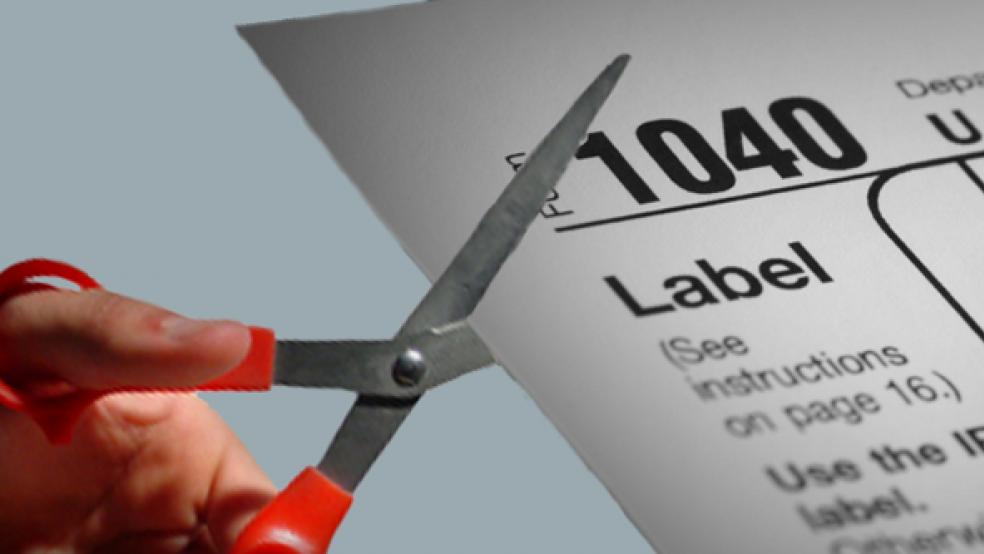The long-awaited simplification of the tax code being drafted by House Republicans would slash the top income tax rate to 25 percent from 39.6 percent and impose a surtax on some of the nation’s wealthiest households.
Under the proposal, set for release Wednesday, the vast majority of taxpayers would see little change in the ultimate size of their tax bills, according to a nonpartisan congressional analysis of the legislation.
But the tax system would be dramatically simpler, with seven existing brackets collapsed into just two, set at 10 percent and 25 percent.
In addition, the plan would impose a 10 percent surtax on certain types of earned income over roughly $450,000 a year. The surtax would hit many salaried professionals, such as attorneys and accountants, while dodging farmers and manufacturers — as well as the super-rich, whose income often is derived primarily from interest and investments.
The analysis by the congressional Joint Committee on Taxation, reviewed by The Washington Post, does not indicate which of the hundreds of tax breaks that litter the code would be sacrificed to clear the way for the lower rates.
But it does show that the legislation would achieve some of the most important goals of its author, House Ways and Means Committee Chairman Dave Camp (R-Mich.): a simpler code that lowers rates and collects roughly the same amount of money for the government — all without burdening the poor or unduly benefiting the rich.
“Not only did we meet that goal, but 99 percent of all filers are going to be subject to a rate of 25 percent or less,” said a Republican aide familiar with the plan, who spoke on the condition of anonymity to discuss the legislation before its official release. “Ninety-nine out of 100 is a pretty good grade.”
The release of the legislation will mark the culmination of nearly three years of work by Camp and his GOP colleagues on the committee. Since Republicans took control of the House in 2011, a tax overhaul that would cut the top personal and corporate tax rates to 25 percent has been high on the GOP wish list.
The budget blueprints prepared by House Budget Committee Chairman Paul Ryan (R-Wis.), the party’s 2012 vice presidential nominee, called for such reforms. Early last year, it appeared that Camp had gained a powerful ally in the cause: Senate Finance Committee Chairman Max Baucus (D-Mont.)
Today, however, the viability of Camp’s effort is unclear. Baucus retired from the Senate to become ambassador to China, leaving the Finance Committee in the hands of Sen. Ron Wyden (D-Ore.). Wyden supports tax reform and has in the past drafted his own proposal, but since taking over as chairman he has identified other, less comprehensive policy priorities.
Even many Republicans have grown leery of Camp’s proposal, worried that any simplification plan would have to trim popular tax breaks such as the deduction for home mortgage interest — a disadvantage in an election year.
Republican leaders have not ruled out the possibility of bringing Camp’s legislation to a vote before the full House if it gains momentum — but they haven't made any promises, either.
Meanwhile, the White House continues to show little interest in a comprehensive tax overhaul. While cutting the corporate tax rate from its current 35 percent remains an Obama priority, administration officials have dismissed reform of the individual code, saying it would be mathematically impossible to lower the top rate paid by the wealthy, protect the middle class and achieve Democrats’ goal of raising fresh cash to shrink chronic budget deficits.
Camp’s proposal would raise nothing for deficit reduction. But the analysis by the Joint Committee on Taxation — which provides official estimates for congressional tax proposals — shows that he appears to have threaded that needle otherwise.
The tax burden on the poorest taxpayers — those earning less than $20,000 a year — would initially rise slightly under Camp’s plan as some filers lost part of the refundable credits that now provide them with refunds that are larger than their tax bills.
But that shift would evaporate within a few years, leaving a slight increase in the tax load only for filers at the top of the income scale, particularly those with annual incomes between $500,000 and $1 million.
The details of how Camp would make the math work, however, probably won’t be clear until Wednesday, when he is scheduled to release the plan.
This story originally appeared in The Washington Post.
Read more at The Washington Post:





